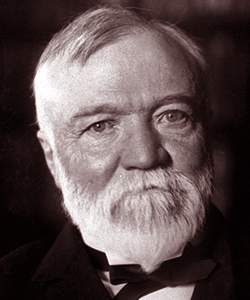Andrew Carnegie, Immigration (American National Biography)
Scholarship
On 17 May 1848 the Carnegies departed from Glasgow on the small sailing vessel Wiscasset. After an arduous ten-week journey, they reached Pittsburgh. They were provided with two rooms rent-free in a house that sister Annie owned on a back alley in Allegheny, across the river from Pittsburgh. One glance at their new home must have convinced even the determined Margaret that she had indeed "spoiled the horn," for here was slum poverty that exceeded anything she had ever seen in Scotland. But there could be no retreat. Her husband must swallow his pride and take a job in a cotton textile factory, and twelve-year-old Andrew must join him as a bobbin-boy in the same factory, earning $1.20 a week.
Joseph Frazier Wall, "Carnegie, Andrew," American National Biography Online, February 2000, http://www.anb.org/articles/10/10-00264.html.
Andrew Carnegie (American National Biography)
Scholarship
Carnegie made significant contributions in his three major areas of interest. As an industrialist, he emphasized the importance of cost of production over the value of profits, he pushed for verticality within his company structure, and he welcomed technological innovation. As a philanthropist, he attempted a scientific analysis of the art of giving, pioneered in the development of the modern philanthropic foundation, and placed education and free inquiry as primary fields of importance in creating a better society. Finally, as a pacifist, Andrew Carnegie pushed for a summit meeting of the great powers, Great Britain, the United States, and Germany, long before such meetings would become a common occurrence in the late twentieth century, and he correctly saw the arbitration of international disputes as the only rational option to the irrational recourse to war.
Joseph Frazier Wall, "Carnegie, Andrew," American National Biography Online, February 2000, http://www.anb.org/articles/10/10-00264.html.



